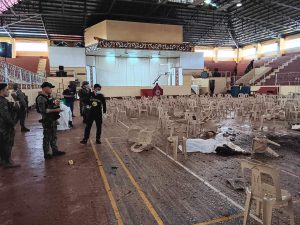Militants from the Islamic State (IS) group have claimed responsibility for a bomb attack in the southern Philippine city of Marawi yesterday that killed at least four people and injured 50 others.
According to Reuters news agency, the group wrote on Telegram that its members detonated a bomb that tore through a gymnasium at the Mindanao State University. At the time, the gymnasium was hosting a Catholic mass to mark the First Sunday of Advent, which begins the four-week run-up to Christmas.
The admission of responsibility came shortly after President Ferdinand Marcos Jr. issued a statement condemning the “senseless and most heinous acts perpetrated by foreign terrorists.”
“Extremists who wield violence against the innocent will always be regarded as enemies to our society,” he said. “I extend my most heartfelt condolences to the victims, their loved ones, and the communities that have been the target of this latest assault on peace. Government assistance to those impacted is ready and forthcoming.”
Catholic Cardinal Orlando Quevedo described the bombing as “the most terrible and most damnable terroristic crime against innocent worshippers on a Christian holy day.” The attack also prompted statements of concern from an attack that also drew statements of concern from foreign governments, including the United States and the European Union.
Marawi, a predominantly Muslim city of 200,000 that serves as the capital of Lanao del Sur province, has previously borne the brunt of fanatical Islamic elements. In May 2017, hundreds of IS-linked militants bearing the group’s black flags occupied large parts of the city, and took many of its residents as hostages. It took five months for Filipino troops to defeat the uprising, by which time about 1,200 people had been killed, including almost 1,000 Islamist militants. The fighting also displaced around 300,000 people.
Yesterday’s bombing attack followed a series of military operations against local pro-IS groups in the southern Philippines, the locus of Islamic insurgencies that the central government has struggled for decades to suppress.
Gen. Romeo Brawner, the chief of the Armed Forces of the Philippines, said yesterday the attack may have been a retaliatory strike for recent military actions, including an air and ground assault that killed 11 suspected members of the terrorist group Dawlah Islamiyah in Maguindanao del Sur on Friday. Dawlah Islamiyah is the Filipino name for Islamic State.
According to Reuters, police offices in Mindanao and the capital region have since been placed on high alert, while police checkpoints have been tightened “to prevent possible follow-up incidents,” senior police official Emmanuel Peralta told a press conference. Peralta said that the coast guard has directed its districts to intensify pre-departure inspections at ports.
On Facebook, the Lanao del Sur government shared photos of Mamintal Adiong Jr., the governor of the province, accompanying military officials in surveying the damage in the gymnasium at Mindanao State University, which was scattered with debris from the explosion of the bomb.
Adiong condemned the explosion and said that the authorities would “make sure justice will be served,” Rappler reported. “Here in my province, we uphold basic human rights, and that includes the right to religion,” he said.

































